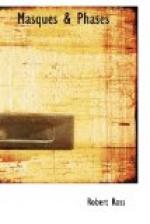(1902.)
HOW WE LOST THE BOOK OF JASHER.
Everyone who knows anything about art, archaeology, or science has heard of the famous FitzTaylor Museum at Oxbridge. And even outsiders who care for none of these things have heard of the quarrels and internal dissensions that have disturbed that usual calm which ought to reign within the walls of a museum. The illustrious founder, to whose munificence we owe this justly famous institution, provided in his will for the support of four curators, who govern the two separate departments of science and art. The University has been in the habit of making grants of money from time to time to these separate departments for the acquisition of scientific or archaeological curiosities and MSS. I suppose there was something wrong in the system, but whatever it may be, it led to notorious jealousies and disputes. At the time of which I write, the principal curators of the art section were Professor Girdelstone and Mr. Monteagle, of Prince’s College. I looked after the scientific welfare of the museum with Lowestoft as my understudy—he was practically a nonentity and an authority on lepidoptera. Now, whenever a grant was made to the left wing of the building, as I call it, I always used to say that science was being sacrificed to archaeology. I mocked at the illuminated MSS. over which Girdelstone grew enthusiastic, and the musty theological folios purchased by Monteagle. They heaped abuse upon me, of course, when my turn came, and cracked many a quip on my splendid skeleton of the ichthyosaurus, the only known specimen from Greenland. At one time the strife broke into print, and the London press animadverted on our conduct. It became a positive scandal. We were advised, I remember, to wash our dirty linen at home, and though I have often wondered why the press should act as a voluntary laundress on such occasions, I suppose the remark is a just one.
There came a day when we took the advice of the press, and from then until now science and art have gone hand in hand at the University of Oxbridge. How the breach was healed forms the subject of the present leaf from my memoirs.




